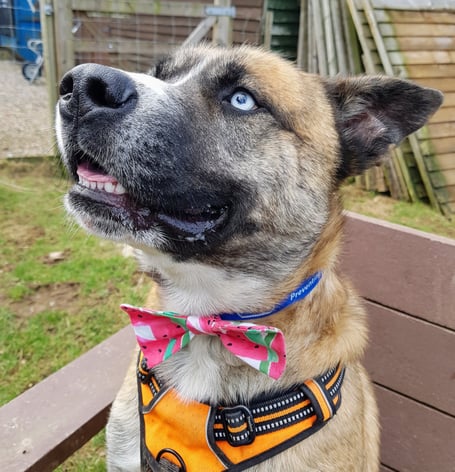THE RSPCA has launched its annual Adoptober campaign promoting adoption of rescued animals as new figures reveal more animals are coming into shelters while the rate of rehoming has slowed - but Devon is bucking the trend.
The animal welfare charity has released new figures that show nationally (across England and Wales) rehoming has dropped 10 per cent while animal intake is up 8.4 per cent year-on-year.
The charity fears that the cost of living crisis means more animals are coming into its care while less people are considering taking on a new pet.
It has highlighted a potential animal rescue crisis as more animals come into care, stay in rescue centres for longer, with less people coming forward to adopt.
In 2021, the RSPCA’s network of centres and branches rehomed 26,945 animals; an 8 per cent drop compared to the previous year when 29,358 animals were rehomed, despite the Covid pandemic affecting the way in which charities across the nation could rehome.
The number of dogs rehomed by the charity also fell 6 per cent from 4,877 in 2020 to 4,567 in 2021; while cats dropped 12 per cent from 17,868 in 2020 to 15,579 in 2021.
In Devon, the total number of animals rehomed increased by 5 per cent from 563 in 2020 to 593 in 2021; bucking the trend seen in most other counties.
The number of dogs rose 8 per cent from 109 to 118; rabbits also crept up from 68 to 72 (5% up); and other pets increased 50 per cent from 100 to 150. The number of cats rehomed, however, fell by 12 per cent from 286 to 253.
Across England and Wales, the average stay for an animal also increased for dogs by 9.4 per cent - from 85 days in 2020 to 93 days in 2021 - and for rabbits - from 104 in 2020 to 117 in 2021, an increase of 12.5 per cent. Cats length of stay remained the same at 67 days.
Pet welfare expert Dr Samantha Gaines said: “It’s really concerning to see that animals are staying in our care for longer and that less are being rehomed year-on-year. Unfortunately, we believe we’re really starting to see the devastating impact of the Covid-19 pandemic and the cost of living crisis.
“Many of the animals - particularly dogs - who are coming into our care have behavioural challenges which could be linked to how they were bred as well as lockdown limiting the amount of training, socialising and outside world experience they had.
“We’re also beginning to see more animals coming into our care because their owners simply couldn’t afford to care for them any more; or, in the most extreme cases, having been neglected or abandoned due to the rising cost of pet care.
“Sadly, this is coming at the same time that potential pet owners are deciding now is not the best time to take on an animal due to the soaring cost of living, and feeling they cannot financially commit to adding a pet to their family at such a worrying time.
“For those who are able to bring a pet into their home, we are urging them to really consider adopting rather than buying. Many of our animals will already be neutered, vaccinated and treated for fleas and worms - making it much more cost-effective - and we will work them to make sure they find their perfect match.”
The RSPCA’s Animal Kindness Index - released earlier this year - highlighted the impact the cost of living crisis is having on pet owners. The survey found that 68 per cent of pet owners were concerned about the increasing cost of pet care while 19 per cent were worried about being able to afford to feed their pets.
Figures released by the charity in August revealed that its cruelty line was receiving more than 100 reports a day of animals being abandoned throughout 2021; and the concern is that the cost of living crisis could lead to this riding even higher.
Anyone who could give a rescue pet a loving new home can visit www.rspca.org.uk/findapet to see all of the animals currently in the charity’s care who are looking for their paw-fect match.





Comments
This article has no comments yet. Be the first to leave a comment.